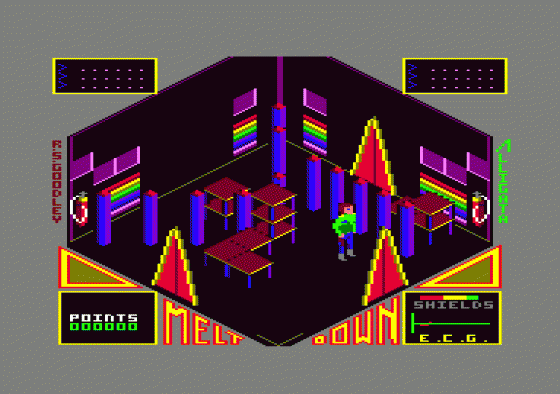
Computer Gamer
 1st August 1986
1st August 1986
Categories: Review: Software
Publisher: Alligata
Machine: Amstrad 6128
Published in Computer Gamer #17
Meltdown
This is the much vaunted 'mega-game' from Alligata and is the first (as far as I know) to be written especially for the 6128 using all that extra memory and disc access.
To tell the truth, I can't see that it has made much difference, but I shall come to that later. The game is the room-to-room exploration/kill aliens types of game with the added interest of having to use certain computer terminals to play 'sub' games and find passwords to get through the various levels.
The plot of the game is that 'Star-Wars' SDI reactor on the moon is approaching meltdown, and it is your ob to stop it. You also have the added difficulty of the defence droids out to stop you.

What disappointed me the most is that the graphics of the game are very jerky and slow and that only one attacking android is active at any one time, so even if you wal into a room full of them, they will come at you singly. And you can only shoot at them when they are moving.
The graphics are very colourful as they use the Amstrad's 16 colour mode, but whereas some games can use anti-aliasing to get around this and make the edges look less drastic. This is not done in Meltdown, so it makes all the graphics look a bit too chunky.
The sub-games are hard without being testing, better gameplay in these would have been much appreciated. As they stand, they are fairly boring.
The software speech is very good and the infection is made to make it sound like a Dalek, which fits in nicely with the game. Unfortunately, this is the only good part of the game. As the levels get more difficult the game improves slightly, but nothing enough to merit further comment. Though I haven't seen the last stage where you have to re-program the computer using a new built-in language. This section has a lot of promise, but going by the rest of the game, I am not going to hold my breath going for it.
The game's idea had a lot of potential but, alas, this unfortunately has not been realised. Perhaps next time...




